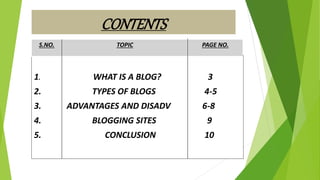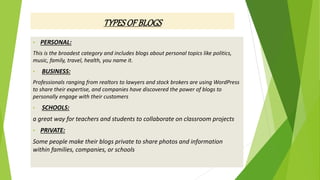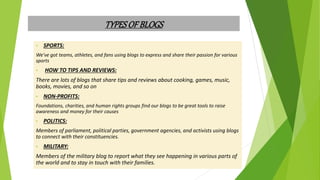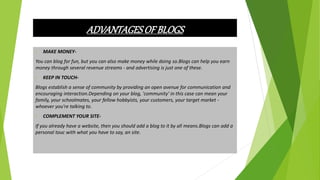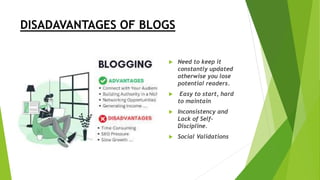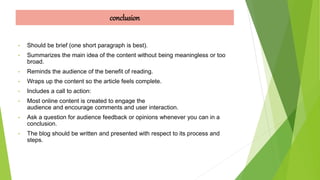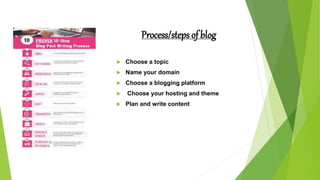blogs.pptx BLOGS POWER POINT PRESENTATIO
- 1. IDEAL INSTITUTE OF MANAGEMENT AND TECHNOLOGY BLOGS BY-VINIT SHARMA BBA(CAM)6 ROLL NO-02621001921
- 2. CONTENTS 1. WHAT IS A BLOG? 3 2. TYPES OF BLOGS 4-5 3. ADVANTAGES AND DISADV 6-8 4. BLOGGING SITES 9 5. CONCLUSION 10 S.NO. TOPIC PAGE NO.
- 3. WHAT IS A BLOG? A blog (a derivative of "web" and "log") is essentially an online diary, where anyone with a basic knowledge of computers can post anything random thoughts, photos, homework, and poetry, just to name a few-for the rest of the world to see. Blogs range in scope from individual diaries to political campaigns, media programs, and businesses. They range in scale from the writings of one occasional author (known as a blogger), to the collaboration of a large community of writers.Many blogs enable visitors to leave public omments, which can lead to a community of readers centred around the blog. Hence, the totality of weblogs or blog-related websites is known as a "blogosphere.
- 4. ŌĆó PERSONAL: This is the broadest category and includes blogs about personal topics like politics, music, family, travel, health, you name it. ŌĆó BUSINESS: Professionals ranging from realtors to lawyers and stock brokers are using WordPress to share their expertise, and companies have discovered the power of blogs to personally engage with their customers ŌĆó SCHOOLS: a great way for teachers and students to collaborate on classroom projects ŌĆó PRIVATE: Some people make their blogs private to share photos and information within families, companies, or schools TYPESOFBLOGS
- 5. TYPESOFBLOGS ŌĆó SPORTS: We've got teams, athletes, and fans using blogs to express and share their passion for various sports ŌĆó HOW TO TIPS AND REVIEWS: There are lots of blogs that share tips and reviews about cooking, games, music, books, movies, and so on ŌĆó NON-PROFITS: Foundations, charities, and human rights groups find our blogs to be great tools to raise awareness and money for their causes ŌĆó POLITICS: Members of parliament, political parties, government agencies, and activists using blogs to connect with their constituencies. ŌĆó MILITARY: Members of the military blog to report what they see happening in various parts of the world and to stay in touch with their families.
- 6. ADVANTAGESOF BLOGS 1. Freedom of speech. 2. Share knowledge with other people. 3. Make friends online . 4. Can be used as a diary . ŌĆó EASY AND FREE- ŌĆó All you need is a computer with an Internet connection and you're good to go.There are several free blogging services available on the Internet, and most of them are so easy to use that you can start blogging within minutes of signing up. ŌĆó EXPRESS YOURSELF- Everyone wants to be heard. By posting your opinions and thoughts on the web you are potentially being heard by a global audience.Just knowing that your opinions are being heard is sometimes reward enough in itself.
- 7. ADVANTAGESOF BLOGS ŌĆó MAKE MONEY- You can blog for fun, but you can also make money while doing so.Blogs can help you earn money through several revenue streams - and advertising is just one of these. ŌĆó KEEP IN TOUCH- Blogs establish a sense of community by providing an open avenue for communication and encouraging interaction.Depending on your blog, 'community' in this case can mean your family, your schoolmates, your fellow hobbyists, your customers, your target market - whoever you're talking to. ŌĆó COMPLEMENT YOUR SITE- If you already have a website, then you should add a blog to it by all means.Blogs can add a personal touc with what you have to say, an site.
- 8. DISADAVANTAGES OF BLOGS ’üĄ Need to keep it constantly updated otherwise you lose potential readers. ’üĄ Easy to start, hard to maintain ’üĄ Inconsistency and Lack of Self- Discipline. ’üĄ Social Validations
- 9. conclusion ŌĆó Should be brief (one short paragraph is best). ŌĆó Summarizes the main idea of the content without being meaningless or too broad. ŌĆó Reminds the audience of the benefit of reading. ŌĆó Wraps up the content so the article feels complete. ŌĆó Includes a call to action: ŌĆó Most online content is created to engage the audience and encourage comments and user interaction. ŌĆó Ask a question for audience feedback or opinions whenever you can in a conclusion. ŌĆó The blog should be written and presented with respect to its process and steps.
- 10. Process/steps of blog ’üĄ Choose a topic ’üĄ Name your domain ’üĄ Choose a blogging platform ’üĄ Choose your hosting and theme ’üĄ Plan and write content
- 11. FAMOUS BLOGGING SITES ’üĄ YourStory ’üĄ ShoutMeLoud ’üĄ TechCrunch ’üĄ IndiaIndiTales ’üĄ Labnol by Amit Agarwal ’üĄ ScoopWhoop ’üĄ FoneArena ’üĄ Verve Magazine ’üĄ BlogGadgets To Use ’üĄ IndiBlogger
- 12. THANKYOU

